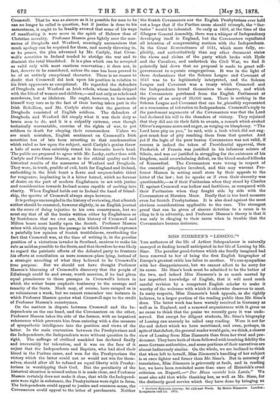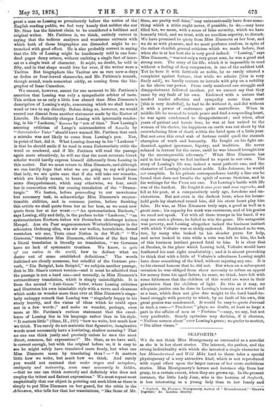MISS ZIMMERN'S "LESSING.".
1HE authoress of the life of Arthur Schopenhauer is naturally annoyed at finding herself anticipated in her life of Lensing by Mr. Sime. The peculiar good-fortune which she fondly imagined had been reserved to her of being the first English biographer of Europe's greatest critic has fallen to another. We can sympathise with her disappointment, but we cannot affect to be sorry for its cause. Mr. Sime's book must be admitted to be the better of the two, and indeed Miss Zimmern's is so much marred by her imperfect knowledge of English, that it will need much careful revision by a competent English scholar to make it worthy of the welcome with which it otherwise deserves to meet. In many respects, Miss Zimmern's book appeals, as she rightly believes, to a larger portion of the reading public than Mr. Sime's does. The latter work has been warmly received in Germany as well as in England, and a renewed acquaintance with it gives us no cause to think that the praise we recently gave it was unde- served. But except for diligent students, Mr. Sine's biography of Leasing can scarcely be called easy reading. Were it not for the sad defect which we have mentioned, and even, perhaps, in spite of that defect, the general reader would gain, we think, a clearer view of Leasing from Miss Zimmern than from her rival and pre- decessor. They have both of them followed with touching fidelity the same German authorities, and some portions of their narratives are almost ludicrously similar. On the whole, we are inclined to think that when left to herself, Miss Zimmern's handling of her subject is at once lighter and firmer than Mr. Sime's. But in accuracy of translation, Miss Zimmern is grievously at fault, and in reading her, we have been reminded more than once of Heinrich's cruel criticism on Ruperti,—"Der Mann versteht kein Lakin." We must also add tbat while thanking her, as well as Mr. Sime, for the distinctly good service which they have done by bringing so By Bolen Zimmern. London ;
great a man as Leasing so prominently before the notice of the English reading public, we feel very keenly that neither she nor Mr. Sime has the faintest claim to be considered a brilliant and original writer. Mr. Pattison is, we think, entirely correct in saying that the tedious analyses and wearisome extracts with which both of these biographies are distended might be re- trenched with good effect. He is also probably correct in saying that the life of Leasing might be handsomely told in one hun- dred pages demy octavo, without omitting a single fact of inter- est or a single trait of character. It might, no doubt, be told in fifty, and in that shape would live for ever, if the writer were a Tacitus. But biographers like Tacitus are as rare now-a-days as dodos or four-leaved shamrocks, and Mr. Pattison's remark, though sound, reads somewhat oddly, as coming from the bio- grapher of Isaac Casaubon.
We cannot, however, assent for one moment to Mr. Pattison's assertion that Leasing was only a sympathetic arbiter of taste. This strikes us as only a little less absurd than Miss Zimmern's description of Lessing's style, concerning which we shall have a word or two to say directly. Before doing so, however, we would record our dissent from another statement made by the Rector of Lincoln. He distinctly charges Leasing with ignorantly render- ing, in his " Laokoon," Kpopion, by "son of time." Now Leasing's amusing criticism of Lange's mistranslation of Kpopih by "Saturnischer Vater "should have warned Mr. Pattison that such a mistake was not likely to come from Leasing's pen. Nor, in point of fact, did it. What Leasing does say in his " Laokoon " is that he should smile if he read in some Euhemeristic critic the word so rendered, and if Mr. Pattison will read the passage again more attentively, he will see that the most accurate Greek scholar would hardly express himself differently from Leasing in this matter. But we must return to Miss Zimmern, and although we can hardly hope that what we are going to say will please that lady, we are quite sure that if she will take our remarks, which are kindly meant, to heart, she will save herself from some disappointment, which may otherwise, we fear, await her in connection with her coming translation of the " Drama- turgie." We hasten, before proceeding to our unwelcome but necessary task, to acknowledge Miss Zimmern's unques- tionable abilities, and in common justice, before finishing this article we shall quote from her at her best, as we must now quote from her at her worst :—" An systematischen Biichem," says Leasing, slily and drily, in the preface to his "Laokoon," " an systematischen Biichern haben wir Dentachen iiberhaupt keinen Mangel. Aus ein Paar angenommenen Worterklarungen in der schonsten Ordnung all es, was wir nur wollen, herzuleiten, darauf verstehen wir tins, Trotz einer Nation in der Welt :" " We Germans," translates Miss Zimmern, oblivious of the fact that a literal translation is literally no translation, " we Germans have no lack of systematic treatises. We know, in spite of one nation in the world, how to deduce what we desire out of some established definitions." The words italicised are clearly nonsense, but mindful of the German pro- verb, " Ein Beispiel, kein Beispiel," we subjoin another passage, first in Mr. Sime's correct version—and it must be admitted that the passage is not a hard one—and secondly, in Miss Zimmern's extraordinary translation, which is simply unintelligible. It is from the second " Anti-Goeze " letter, where Leasing criticises and illustrates his own inimitable style with a verve and clearness which make us wonder more than ever at Miss Zimmern's singu- larly unhappy remark that Leasing was " singularly happy in his steely brevity, and the vistas of ideas which he could open out in a few words ;" and make us wonder, perhaps, even more at Mr. Pattison's curious statement that the excel- lence of Leasing lies in his language rather than in his style. " It matters little" (Sime, II., 210) "how we write, but much how we think. You surely do not maintain that figurative, imaginative words must necessarily have a hesitating, shallow meaning ? That no one can think justly and precisely unless he uses the most direct, common, flat expressions?" Mr. Sime, as we have said, is correct enough, but with the original before us, it is easy to see he might safely have translated more freely, but what can Miss Zimmern mean by translating thus ? — " It matters little how we write, but much how we think. And surely you would not contend that under tropes and metaphors, ambiguity and insincerity, sense must necessarily be hidden, —that no one can think correctly and definitely who does not employ the tritest and flattest expressions." We must repeat most emphatically that our object in pointing out such blots as these is simply to put Miss Zimmern on her guard, for the critic in the Athenteum, who tells her that her translations, " like those of Mr.
Sime, are pretty well done," may unintentionally have done some- thing which a critic ought never, if possible, to do,—may have filled her, we mean, with a sense of false security, which we have honestly tried, and we trust, with no needless asperity, to disturb. We have promised to quote from Miss Zimmern at her best, and we do so with pleasure, and we must perforce confess, in spite of the rather churlish general criticism which we made before, that when she is at her best she is very good indeed. " Leasing," says Miss Zimmern, " was not only a very great man, he was a good and strong man. The story of his life, which it is impossible to read without a feeling of deep compassion, is one of the saddest told. Yet he bore it with fortitude so noble, he so rarely uttered a complaint against fortune, that while we admire [this is very finely said], we hardly venture to intrude with pity on a nobility so far above our power. From early manhood one struggle and disappointment followed another, yet we cannot say that they came by any fault of his own. Endowed with a nature that needed tender affection and sympathy more than most [this is very doubtful], he had to do without it, and did without it with a power of endurance quite marvellous. When in middle-life he seemed to touch peace and find a responding heart, he was again condemned to disappointment ; and when, after years of patient and heroic love, he was at last united to the woman of his choice, his happiness on earth was cut short by the overwhelming blow of death within the brief span of a little year. But not even this cruel stab of fortune could quell the staunch champion of truth and humanity. He fought on his fight un- daunted, against ignorance, bigotry, and tradition. He never relaxed in fervour for the cause, until he was himself brought low by the unconquerable adversary." What Miss Zimmern has said in her language we feel inclined to repeat in our own. The story of Lessing's life was, indeed a most pathetic one, and the character of Leasing's mind most noble. Like Johnson, he would not complain. In his private correspondence hardly a line can be found that does not breathe the spirit of serene Stoicism, and in his writings for the Press not one. Yet Leasing's battle with life was of the hardest. lie fought it sans peur and sans reproche, and fell at his post, at a comparatively early age, foredone and un- victorious. But not even in the darkest hour, when his house- hold gods lay shattered round him, did his stout heart play him false. He was, as Miss Zimmern truly says, a good as well as a great man ; his capacity for work was enormous, and of his genius we need not speak. Yet with all these trumps in his hand, if we may use such a phrase, he failed to win the game. His antagonist was poverty, and Leasing altogether lacked the business instinct with which Voltaire was so richly endowed. Burdened as he was, too, by many who looked to his slender purse for help, and never looked in vain while a coin was left to him, the lack of this business instinct proved fatal to him. It is clear that at Breslau, in the place which Leasing held, Voltaire would have feathered his nest right comfortably ; and it is almost provoking to think that with a little of Voltaire's adroitness Leasing might have done something of the kind, without injuring any one. It is to his eternal honour that he did not. But when on a subsequent occasion he was obliged from sheer necessity to refuse an appeal for money from his aged father, he must, we think, have felt with some bitterness that the children of this world are wiser in their generation than the children of light. Be this as it may, no adequate justice can be done to Leasing's honesty as a writer and as a man, which does not give due weight to the hard hand-to- hand struggle with poverty to which, by no fault of his own, this great genius was condemned. It would be easy to quote Juvenal in such a case—" Prudence " plays, no doubt, at least as large a part in the affairs of men as " Fortune "—easy, we say, but not very profitable. Sturdy optimism may declaim, if it chooses, " Nullum numen abest " over Leasing's grave ; we prefer to mutter, " Dis aliter visum."



































 Previous page
Previous page